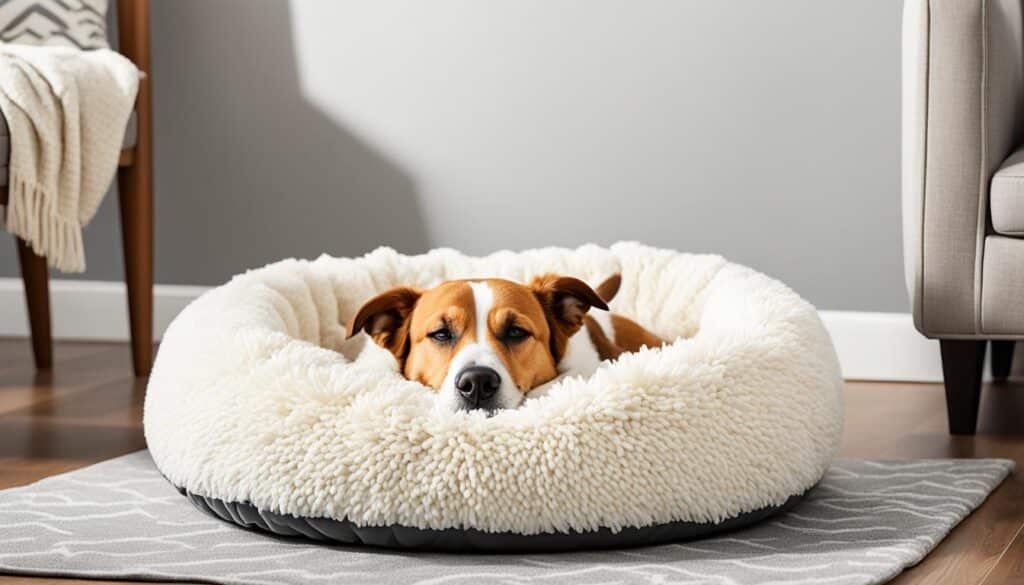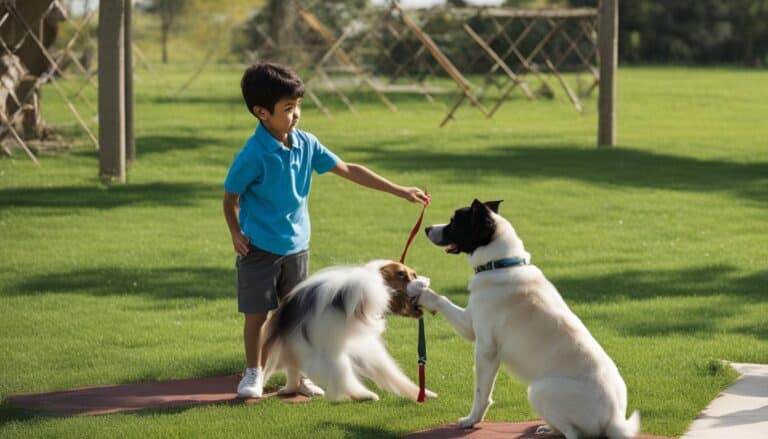How to Train a Dog to Sleep Through the Night
Training a dog to sleep through the night is essential for both the dog’s well-being and your peace of mind. If you’re tired of waking up to your furry friend barking, scratching, or whining in the middle of the night, it’s time to implement some canine sleep training techniques. By following these methods and being consistent in your approach, you can teach your dog to sleep peacefully at night.
To begin, start by giving your dog adequate exercise during the day. Just like humans, dogs need physical activity to tire them out and promote healthy sleep. Take your dog for long walks in the morning and evening to help them release energy. Additionally, engaging them with stimulating toys throughout the day and providing calming chew toys and bones close to bedtime can also help your dog relax before sleep.
Establishing a feeding routine is another important aspect of training your dog to sleep at night. Avoid feeding your dog too close to bedtime, as a full stomach can lead to increased energy levels. Instead, establish consistent meal times and portion sizes. Consider offering a small pre-bedtime treat on their crate or bed to reinforce the association between bedtime and sleep.
Creating a comforting sleep zone for your dog is essential. Whether it’s a crate or a designated sleeping area, make sure it is inviting and calming. Surround the area with objects and toys that promote relaxation. Use soft, warm, non-toxic fabrics and ensure enough privacy while still allowing for human contact, as dogs often find comfort in being near their owners while they sleep.
Another important aspect to consider is enforcing potty training. Take your dog out right before bedtime to minimize nighttime disturbances. If your dog does wake up in the middle of the night needing to go out, keep the focus on potty breaks only, rather than turning it into playtime.
Keeping your dog hydrated throughout the day also contributes to a good night’s sleep. Ensure their water bowl is filled and consider adding ice cubes for a refreshing drink. Adequate hydration prevents discomfort and promotes a calm and restful sleep.
If your efforts to train your dog to sleep through the night are not successful, it may be beneficial to seek veterinary assistance. A veterinarian can help identify any underlying health issues or behavioral problems that may contribute to your dog’s sleep disturbances and provide specific recommendations tailored to your dog’s needs.
Remember, consistency is key when training your dog to sleep at night. Stick to a regular sleep schedule and maintain consistency in exercise, feeding, potty breaks, and the sleep environment. With time, patience, and perseverance, you can successfully train your dog to sleep peacefully through the night.
Give Adequate Exercise
Providing your dog with enough exercise is essential for ensuring a good night’s sleep. Different breeds have varying exercise needs, so it’s important to understand your dog’s specific requirements. Taking your furry friend for long walks in the morning and evening can help tire them out and prepare them for a night of restful sleep. Additionally, incorporating stimulating indoor dog toys into their daily routine can help expel excess energy during the day. Providing calming chew toys and bones close to bedtime can also be beneficial in promoting relaxation.
To promote peaceful sleep, it’s crucial to engage your dog physically and mentally throughout the day. Regular exercise not only tires them out but also helps alleviate any anxiety or restlessness they may experience at night. By dedicating time to physical activity and providing appropriate toys, you can help your dog settle down and sleep soundly all night long.
- Take your dog for long walks in the morning and evening
- Use stimulating indoor dog toys during the day
- Provide calming chew toys and bones close to bedtime
Establish a Feeding Routine
Maintaining a consistent feeding routine is an essential part of establishing a bedtime routine for dogs. Feeding your dog too close to bedtime can lead to increased energy levels, making it challenging for them to settle down for sleep. By establishing a feeding schedule with consistent meal timings and portion sizes, you can help regulate your dog’s appetite and energy levels.
When it comes to feeding your dog, it’s important to choose high-quality, nutritious dog food that meets their specific dietary needs. Consult with your veterinarian to determine the appropriate portion sizes based on your dog’s age, weight, and activity level.
In addition to regular mealtimes, offering a small pre-bedtime treat on their crate or bed can help reinforce the association between bedtime and sleep. Choose a treat that is appropriate for your dog’s size and dietary restrictions. Avoid treats high in sugar or caffeine, as these can lead to restlessness and disrupt their sleep.
Remember, consistency is key in establishing a feeding routine. Stick to the same meal times and avoid giving excessive treats or table scraps throughout the day. By providing structure and consistency in your dog’s feeding routine, you can contribute to a smoother bedtime routine and help them sleep more soundly through the night.
Next, we’ll explore how to create a comforting sleep zone for your dog to enhance their sleep quality and promote relaxation.
Create a Comforting Sleep Zone
Creating a comforting sleep environment for your dog is essential to promote restful sleep. Dogs, like humans, require a calm and inviting space to relax and unwind. Whether your dog sleeps in a crate or has a designated sleeping area, make sure it is set up to provide maximum comfort.
To create a cozy sleep zone, surround the area with objects and toys that encourage relaxation. Soft, warm, non-toxic fabrics, such as plush blankets or beds, can provide a comfortable surface for your dog to sleep on.
Additionally, consider placing a familiar item with your scent, like a t-shirt or a blanket, in your dog’s sleeping area. This can help reassure them and make them feel more secure.

While it’s important to create a comforting sleep zone, it’s also crucial to find the right balance between privacy and human contact. Dogs often find it comforting to be near their owners while they sleep. However, some dogs may prefer a more secluded space without too much external stimulation. Observe your dog’s behavior and adjust the sleeping area accordingly.
By creating a relaxing sleep zone tailored to your dog’s needs, you can help them get the quality sleep they need for optimum health and well-being.
Enforce Potty Training
Encouraging good potty training habits is an essential step in training a puppy to sleep peacefully through the night. By establishing a consistent routine, you can help prevent nighttime disturbances and promote a smooth sleep routine for your furry friend.
Start by taking your puppy out to relieve themselves right before bedtime. This will empty their bladder and reduce the chance of waking up in the middle of the night needing to go out. Avoid allowing fluid intake close to bedtime to minimize the need for bathroom breaks during the night.
If your puppy does wake up in the middle of the night needing to go out, remember to keep the focus on potty breaks only. Refrain from turning it into playtime or engaging in any stimulating activities. This will help your puppy understand that nighttime is for quiet potty breaks and not for socializing or playing.
Consistency is key when it comes to potty training. Stick to a regular schedule for bathroom breaks during the day and reinforce positive behavior with rewards or praise. Over time, your puppy will learn to associate nighttime with restful sleep, leading to a peaceful night for both of you.

- Take your puppy out to relieve themselves right before bedtime
- Avoid fluid intake close to bedtime
- Keep nighttime potty breaks focused on the task at hand
- Reinforce positive behavior with rewards or praise
Keep Your Dog Hydrated
Adequate hydration is important for your dog’s overall well-being and can contribute to a good night’s sleep. Dogs, just like humans, need to stay properly hydrated to maintain their health and energy levels. Ensuring that your dog’s water bowl is always filled throughout the day is crucial. Remember to provide fresh, clean water and change it regularly to prevent bacteria buildup.
Consider adding some ice cubes to your dog’s water bowl to provide a refreshing and cooling drink, especially during hot weather or if your dog is active. This can help regulate their body temperature and keep them comfortable during sleep. However, make sure to monitor your dog’s intake and adjust as needed, as some dogs may be sensitive to cold water.
Keeping your dog properly hydrated can prevent discomfort, such as dry mouth or thirst, which could interrupt their sleep. Additionally, it promotes better digestion, healthy organ function, and overall well-being.
Remember, each dog’s hydration needs may vary, depending on factors such as size, breed, activity level, and weather conditions. It’s important to pay attention to your dog’s behavior and monitor any signs of dehydration, such as excessive panting or dark yellow urine. If you notice any concerning symptoms, it’s always best to consult with your veterinarian for specific advice tailored to your dog’s needs.
Seek Veterinary Assistance
If your dog continues to struggle with sleeping through the night despite your efforts, it may be beneficial to consult with a veterinarian. A vet can help identify any underlying health issues or behavioral problems that may be contributing to your dog’s sleep disturbances.
They can provide guidance on how to train your dog to sleep through the night and offer specific recommendations tailored to your dog’s needs.
It’s important to remember that each dog is unique, and what works for one may not work for another. A veterinarian will have the knowledge and expertise to assess your dog’s individual situation and provide suitable solutions.
If there are no underlying health concerns, the vet may recommend behavioral modifications or suggest implementing additional sleep aids. They may also advise on creating a soothing bedtime routine or incorporating natural remedies to promote relaxation.
Seeking veterinary assistance is especially crucial if your dog’s sleep disturbances are accompanied by other concerning symptoms like restless behavior, excessive panting, or changes in appetite or behavior.
- Consulting with a veterinarian ensures you have a comprehensive understanding of your dog’s sleep issues and access to professional advice.
- Vets may recommend other interventions like medication or specialized training techniques that are proven to be effective in helping dogs sleep through the night.
- Don’t hesitate to reach out to a veterinarian if your dog’s sleep problems persist despite your best efforts.
Remember, seeking veterinary assistance can provide valuable insights and support, helping your dog achieve a restful and uninterrupted night’s sleep.
Consistency is Key
When it comes to training your dog to sleep through the night, consistency is crucial. Dogs thrive on routine and structure, so establishing and maintaining a regular sleep schedule is essential. Whether you have a playful puppy or an older dog, following consistent practices in exercise, feeding, potty breaks, and sleep environment will help them develop healthy sleep habits.
Start by setting specific times for exercise during the day to help your dog expend energy and prepare for a restful night. Regular walks and engaging playtime activities will tire them out, making it easier for them to settle down at bedtime. Additionally, maintaining a consistent feeding schedule will prevent your dog from having a full stomach close to bedtime, which can interfere with their sleep.
Establishing a designated sleep zone for your dog is also important. Whether it’s a cozy crate or a comfortable bed, ensure that the area is inviting and calming. Use soft bedding, soothing scents, and familiar toys to create a sleep environment that encourages relaxation. Dogs often find comfort in being close to their owners, so allowing them to sleep near you can provide a sense of security.
Lastly, be patient and persistent in sticking to the new sleep routine. It may take time for your dog to adjust and establish a consistent sleep pattern. Stay committed to the training process, and with time, your furry friend will learn to sleep peacefully through the night.






